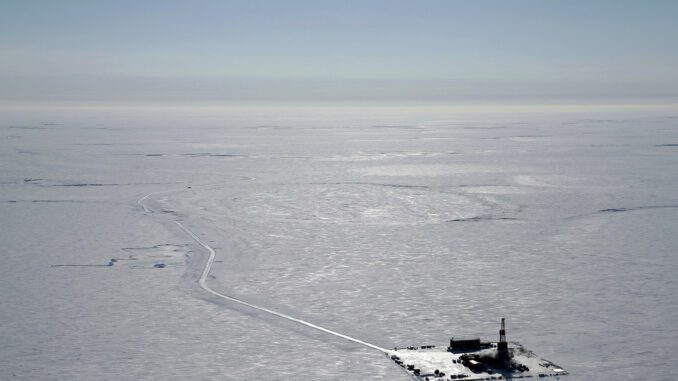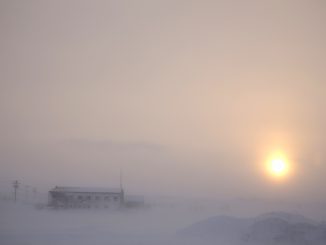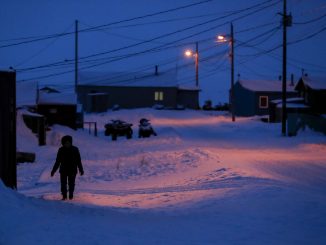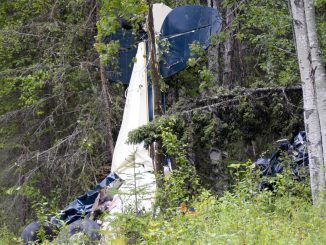
WILMINGTON, Del. — The Biden administration said Monday it is approving the huge Willow oil-drilling project on Alaska’s petroleum-rich North Slope, a major climate move by President Joe Biden that drew quick condemnation from environmentalists who said it flies in the face of the Democratic president’s pledges.
The announcement came a day after the administration, in a move in the other direction, said it would bar or limit drilling in some other areas of Alaska and the Arctic Ocean.
The Willow approval by the Bureau of Land Management would allow three drill sites, which would include up to 199 total wells. Two other drill sites proposed for the project would be denied. Project developer ConocoPhillips has said it considers the three-site option workable, “the right decision for Alaska and our nation” in the words of company chairman and CEO Ryan Lance.
Houston-based ConocoPhillips will relinquish rights to about 68,000 acres of existing leases in the National Petroleum Reserve-Alaska.
The order, one of the most significant of Interior Secretary Deb Haaland’s tenure, was not signed by her but rather by her deputy, Tommy Beaudreau, who grew up in Alaska and has a close relationship with state lawmakers. She was notably silent on the project, which she had opposed as a New Mexico congresswoman before becoming Interior secretary two years ago.
Administration officials were concerned that ConocoPhillips’ decades-old leases limited the government’s legal ability to block the project and that courts might have ruled in the company’s favor.
Monday’s announcement is not likely to be the last word, with litigation expected from environmental groups.
The Willow project could produce up to 180,000 barrels of oil a day, create up to 2,500 jobs during construction and 300 long-term jobs, and generate billions of dollars in royalties and tax revenues for the federal, state and local governments, the company said.
The project, located in the federally designated National Petroleum Reserve-Alaska, enjoys widespread political support in the state. Alaska Native state lawmakers recently met with Interior Secretary Deb Haaland to urge support for Willow.
Sen. Lisa Murkowski, R-Alaska, said Monday the decision was “very good news for the country.”
“Not only will this mean jobs and revenue for Alaska, it will be resources that are needed for the country and for our friends and allies,” Murkowski said. “The administration listened to Alaska voices. They listed to the delegation as we pressed the case for energy security and national security.”
Fellow Republican Sen. Dan Sullivan said conditions attached to the project should not reduce Willow’s ability to produce up to 180,000 barrels of crude a day. But he said it was “infuriating” that Biden also moved to prevent or limit oil drilling elsewhere in Alaska.
Christy Goldfuss, a former Obama White House official who now is a policy chief at the Natural Resources Defense Council, said she was “deeply disappointed” at Biden’s decision to approve Willow, which NRDC estimates would generate planet-warming greenhouse gas emissions equivalent to more than 1 million homes.
“This decision is bad for the climate, bad for the environment and bad for the Native Alaska communities who oppose this and feel their voices were not heard,” Goldfuss said.
Anticipating that reaction among environmental groups, the White House announced on Sunday that Biden will prevent or limit oil drilling in 16 million acres in Alaska and the Arctic Ocean. The plan would bar drilling in nearly 3 million acres of the Beaufort Sea — closing it off from oil exploration — and limit drilling in more than 13 million acres in the National Petroleum Reserve.
The withdrawal of the offshore area ensures that important habitat for whales, seals, polar bears and other wildlife “will be protected in perpetuity from extractive development,” the White House said in a statement.
The conservation actions announced Sunday complete protections for the entire Beaufort Sea Planning Area, building upon President Barack Obama’s 2016 action on the Chukchi Sea Planning Area and the majority of the Beaufort Sea, the White House said.
Separately, the administration moved to protect more than 13 million acres within the petroleum reserve, a 23-million acre chunk of land on Alaska’s North Slope set aside a century ago for future oil production.
The Willow project is within the reserve, and ConocoPhillips has long held leases for the site. About half the reserve is off limits to oil and gas leasing under an Obama-era rule reinstated by the Biden administration last year.



